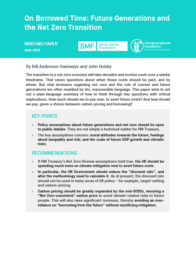The transition to a net zero economy raises questions about when costs should be paid, and by whom. This paper aims to set out a plain-language summary of how to think through two questions with critical implications. How much should we pay now, to avert future costs? And how should we pay, given a choice between carbon pricing and borrowing?
KEY POINTS
- Policy assumptions about future generations and net zero should be open to public debate. They are not simply a technical matter for HM Treasury.
- The key assumptions concern: moral attitudes towards the future; feelings about inequality and risk; and the scale of future GDP growth and climatic risks.
RECOMMENDATIONS
- If HM Treasury’s Net Zero Review assumptions hold true, the UK should be spending much more on climate mitigation now to avert future costs.
- In particular, the UK government should reduce the “discount rate”, and alter the methodology used to calculate it. As at present, the discount rate should not be used in many areas of UK policy – for example, target-setting and carbon-pricing.
- Carbon pricing should be greatly expanded by the mid-2020s, ensuring a “Net Zero-consistent” carbon price to avoid climate-related risks to future people. This will also raise significant revenues, thereby avoiding an over-reliance on “borrowing from the future” without sacrificing mitigation.

